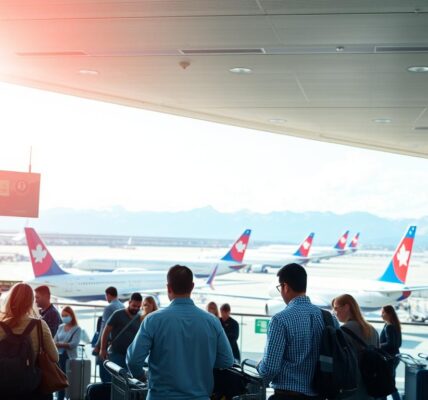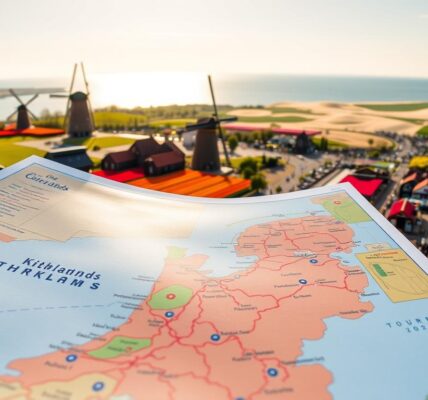Canada Entry Guide: What to Know Before Your Flight
The Canada arrival checklist is key for travelers heading to this vast and diverse country.
It’s especially important for international visitors, like those from Nigeria. Knowing the necessary travel documents for Canada is crucial for a smooth journey.
This checklist covers the essentials for arriving in Canada. It helps ensure travelers have all the important items and documents before they go. With this guide, visitors can easily navigate their entry process.
For more information, see the official travel site:
You will be redirected to another website
Essential Documents for Your Trip
Traveling to Canada needs careful planning, especially for documents. You must know the travel documents required for a smooth trip. This includes a valid passport and the right visa, based on your nationality. It’s also key to understand the different visa types for a hassle-free immigration process.
With recent global health issues, having the right COVID-19 documents is crucial too.
Valid Passport and Visa Requirements
Before heading to Canada, check your passport’s validity for your stay. Most people need a visa to enter, but some can use an Electronic Travel Authorization (eTA). Following Canada’s immigration checklist can make entry easier.
ESTA vs. Visitor Visa
It’s important to know the difference between ESTA and a visitor visa. An ESTA lets some countries’ citizens visit Canada for up to six months for tourism or business. But, if you don’t qualify for ESTA or are traveling for other reasons, you might need a visitor visa.
COVID-19 Documentation
Canada has specific COVID-19 rules for international travelers. You’ll need proof of vaccination, negative test results, and health declarations. Keeping up with these rules is essential, as they can change with health updates. Following these COVID-19 guidelines is a key part of your Canada travel checklist.
Preparing for Your Flight
Traveling to Canada needs careful planning. The journey starts long before you reach the airport. Having the right items and info makes your trip better. A detailed Canada arrival checklist is key to avoid forgetting anything important.
Packing Tips for Canada
What to pack for Canada depends on the season. The weather can change a lot, so layering is smart. Here are some tips:
- Winter: Wear thick jackets, thermal clothes, gloves, scarves, and warm boots.
- Spring and Fall: Pack light jackets, comfy shoes, and clothes that can be worn in different ways.
- Summer: Bring casual clothes, swimwear, and things to protect you from the sun.
Airline and Baggage Policies
Every airline has its own rules for luggage, like size and weight limits. Knowing these rules helps avoid extra fees. Usually, you can bring one carry-on bag and one personal item. Always check the airline’s website for banned items to make sure your bags are okay.
Arrival Times and Check-in Recommendations
Getting to the airport early is important. Aim to arrive at least three hours before your international flight. This gives you time for check-in, security, and boarding. Knowing the check-in process ahead of time can make your airport visit smoother and less stressful.
Understanding Canada’s Entry Requirements
Travelers coming to Canada must follow certain customs and immigration rules. It’s important to know these to make your arrival smooth. This part explains what you need to do, what to declare, and duty-free limits to get ready.
Customs and Immigration Procedures
When you arrive, you’ll face customs and immigration checks. You’ll need a valid passport and visa, if needed. Be ready to answer questions about your visit and how long you’ll stay.
You might also need to fill out a declaration card. This card lists items you’re bringing into Canada.
What to Declare Upon Arrival
There are items you must declare when entering Canada. These include:
- Food products
- Currency over $10,000 CAD
- Gifts valued over $60 CAD
Being truthful when declaring items helps avoid fines or issues. Knowing what to declare is key when arriving in Canada.
Duty-Free Allowances
Shopping can be fun, especially with duty-free allowances. You can bring certain items into Canada without paying taxes or duties. These include:
| Item Type | Allowance |
|---|---|
| Alcohol (over 18 years) | 1.5 liters of wine or 1.14 liters of spirits |
| Tobacco | 200 cigarettes or 50 cigars |
| Gifts | $60 CAD total value |
Health and Safety Guidelines
When traveling to Canada, health and safety should be your top priority. Make sure you have travel insurance to cover unexpected medical costs and trip cancellations. This insurance also protects your wallet from unexpected expenses.
It’s also important to know about vaccination recommendations. This helps prevent common illnesses during your visit. Staying informed about vaccinations is key.
Travel Insurance Considerations
Getting comprehensive travel insurance is crucial. It should cover emergency medical costs, trip interruptions, and lost items. Without it, you could face big financial problems.
When checking your travel documents for Canada, don’t forget to look at your health coverage. This ensures you’re protected in case of emergencies.
Vaccination Recommendations
Keeping up with vaccinations is vital for your health. The Public Health Agency of Canada suggests vaccines based on your health history and destination. Vaccines for measles, mumps, and rubella, as well as flu shots, are important.
Knowing about these vaccinations is essential for a safe trip to Canada. It’s one of the key things to remember.
Emergency Services in Canada
In case of a medical emergency, knowing how to get help is crucial. Canada’s healthcare system is strong. You should learn how to call for emergency services, usually by dialing 911.
Also, find out where the nearest hospitals or clinics are. This knowledge can help you feel safer during your trip.
Transportation Options Upon Arrival
When you arrive in Canada, you’ll find many ways to get to your destination. Knowing these options is key to a smooth start. Whether you choose public transport or rent a car, each has its own perks.
Public Transport vs. Rental Cars
Canada’s public transport, like buses and trains, is a budget-friendly choice. It’s great for cities like Toronto and Vancouver. Make sure to check the schedules to avoid any delays.
Renting a car gives you freedom to explore. You can find rental places at airports and cities. Remember, you’ll need a valid driver’s license and a credit card.
Airport Shuttle Services
Airport shuttles connect airports to hotels and downtown areas. They’re easy to book and a good choice for those new to local transport. They’re also a smart pick for groups, as they can save money.
Taxi and Rideshare Information
Taxis are easy to find at airports and on streets in cities. They offer comfort but make sure they’re licensed for safety. Rideshare apps like Uber and Lyft are also popular. They provide a door-to-door service without the need to use public transport.
| Transportation Option | Pros | Cons |
|---|---|---|
| Public Transport | Cost-effective, extensive networks | Limited to schedules, less privacy |
| Rental Car | Flexible, convenient for exploration | Costly, requires navigation |
| Airport Shuttles | Direct service, pre-arranged | Fixed routes, may require advance booking |
| Taxi | Comfortable, readily available | Can be expensive, traffic can affect fares |
| Rideshare | User-friendly, flexibility | Dependent on app service coverage |
Currency and Payment Methods
Travelers to Canada need to know about currency exchange and payment options. Planning ahead makes arriving in Canada easier. It’s important to know how to exchange money and which payment methods are accepted.
Currency Exchange Guidelines
Visitors from Nigeria should exchange Nigerian Naira for Canadian dollars when they arrive. You can exchange money at airports, banks, and authorized bureaus. Always compare rates and watch out for service fees.
Keep an eye on daily exchange rate changes. This helps you make smart choices.
Using Credit and Debit Cards
Credit and debit cards are widely accepted in Canada. Cards like Visa, Mastercard, and American Express work in many places. Tell your bank about your travel plans to avoid card issues.
Know about foreign transaction fees on your cards. It’s a good idea to carry some cash too. This is useful for small purchases or places that don’t take cards.
Tipping Etiquette in Canada
Tipping is a big part of service in Canada. It shows you appreciate good service. In restaurants, tip 15-20% of the bill. Taxi drivers and hotel staff also expect similar tips.
Knowing the tipping rules can make your visit better. It shows respect for the local customs.
| Service | Standard Tip Percentage |
|---|---|
| Restaurants | 15-20% |
| Taxi Drivers | 10-15% |
| Hotel Staff | $1-2 per night |
| Baristas | $1-2 per drink |
Understanding currency exchange and payment methods in Canada makes your trip smoother. Being prepared ensures a better experience in Canada.
Communication Essentials
Knowing how to communicate in Canada is key for a smooth trip. It’s important to understand local mobile services, internet, and emergency contacts. This info is vital for a smooth arrival and stay in Canada.
SIM Card and Roaming Plans
Travelers have two main options: international roaming or a local SIM card. Local SIMs often give better data rates, especially for longer stays. Major providers like Rogers, Bell, and Telus offer prepaid plans. Make sure your device is compatible before buying.
Wi-Fi Access and Hotspots
Wi-Fi is easy to find in cities, with many cafes and libraries offering free internet. Download apps to find hotspots easily. Always check the security of the networks you use, especially for sensitive info.
Emergency Contacts in Canada
Having emergency contacts handy can be reassuring. Include local emergency services, embassy info, and other important numbers. Get to know local authorities to ensure help is always available.
Exploring Canadian Culture and Etiquette
Travelers to Canada will find a rich mix of traditions and customs. Knowing English and French is key. It helps with communication and shows respect for local ways, making the trip better.
Language Differences: English and French
Canada is officially bilingual, with English and French as the main languages. The use of each language changes by region. For instance, French is big in Quebec, while English is more common elsewhere.
Learning basic phrases in both languages can improve interactions. It also shows respect for Canadian culture.
Social Customs and Etiquette Tips
Getting along with Canadians means knowing their customs. They value politeness and formality at first meetings. Being on time is important, especially for social events.
Saying “thank you” is a simple way to show gratitude. When inviting people, offering snacks or drinks is polite. It shows the warm hospitality of Canadian culture.
Important Canadian Holidays
Travelers should know about Canadian holidays that might affect their trip. Canada Day on July 1st celebrates the country’s founding. It’s celebrated with festivities everywhere.
Thanksgiving in October is a time for family and community. Knowing these holidays helps plan your visit and join in local celebrations.
Accommodations and Lodging
Canada offers a wide range of places to stay, from hotels to cozy bed and breakfasts. You can also find rental apartments. Knowing your options helps you plan a trip that meets your needs and goals.
Types of Lodging Available
Canada has many places to stay. Here are some popular ones:
- Hotels: They range from cheap to very expensive. Hotels have extras like room service and pools.
- Short-term Rentals: Sites like Airbnb let you stay in homes. They often have kitchens and living areas.
- Hostels: Great for those on a tight budget. Hostels have shared rooms and a chance to meet others.
- Bed and Breakfasts: These offer a cozy feel. You get personal service and a homey atmosphere.
Booking Hotels vs. Short-Term Rentals
Choosing between hotels and short-term rentals depends on several things:
| Criteria | Hotels | Short-Term Rentals |
|---|---|---|
| Price | More expensive for luxury | Usually cheaper, especially for longer stays |
| Privacy | Shared spaces with others | More private, with access to the whole home |
| Location | Often in the best spots | Can be in different areas, like residential neighborhoods |
| Amenities | Standard (like breakfast and pools) | Varies, but might have kitchens for cooking |
Family-Friendly Options
Families with kids have many options in Canada. Here are some good choices:
- Hotels with Family Suites: These rooms are big and made for families.
- Vacation Rentals: Renting a whole house is comfy and convenient. It’s great for cooking meals and relaxing.
- Resorts: Family resorts have fun activities for kids. They’re perfect for a fun vacation.
Fun Activities and Attractions
Canada is full of attractions for all kinds of interests. It’s a great place for travelers to explore. Must-see landmarks like the CN Tower in Toronto and Banff National Park show off Canada’s beauty and culture.
Canada’s culture shines through in its seasonal events and festivals. The Calgary Stampede and Ottawa’s Winterlude are just a few highlights. These events let visitors dive into local traditions and add fun to their trip.
Canada’s outdoors offer exciting activities all year round. You can hike in British Columbia, ski in Whistler, or kayak in Lake Louise. These experiences are key to enjoying Canada and making unforgettable memories.
FAQ
What travel documents do I need when traveling to Canada?
You’ll need a valid passport. Depending on where you’re from, you might also need a visa or an Electronic Travel Authorization (eTA). Always check the entry requirements for your country before you go.
Are there any COVID-19 entry requirements for Canada?
Yes, you’ll need to show proof of COVID-19 vaccination. You might also need a negative test result. Make sure to check the latest health rules from the Government of Canada before you travel.
What items should I pack for my trip to Canada?
Pack clothes for different weather, personal toiletries, and any medicine you need. Don’t forget your travel documents and health items. Think about the season and where you’re going.
How should I prepare for customs and immigration upon arrival?
Have all your travel documents ready for inspection. You’ll need to fill out a customs declaration form. Knowing the customs rules can make things easier.
What are the transportation options available upon my arrival in Canada?
You can use public transport like buses and trains, rent a car, or take an airport shuttle. Taxis and Uber are also available. Choose what works best for you.
How can I manage currency exchange and payments in Canada?
You can exchange money at banks or ATMs. Most places accept credit and debit cards. Remember to ask about fees. Tipping is common, so having cash is a good idea.
What is the best way to communicate while in Canada?
Get a local SIM card or use international roaming. Free Wi-Fi is common. Keep a list of emergency contacts handy.
What cultural aspects should I be aware of when visiting Canada?
Canada values diversity, with English and French as official languages. Learning basic phrases helps. Be polite and punctual to connect with locals.
What types of accommodations are available for travelers in Canada?
Canada has hotels, motels, hostels, and Airbnb rentals. Family-friendly options are available, with amenities for kids.
What recreational activities and attractions should travelers consider?
Visit famous landmarks, national parks, and cultural spots. Don’t miss seasonal events and festivals. Outdoor fun like hiking and skiing is a must.
Published on: 16 de April de 2025





